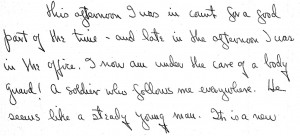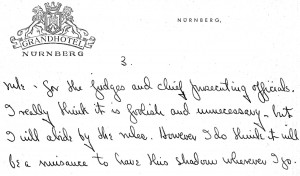The intense pace of the trials continued through early February as the prosecution teams presented their cases before the Tribunal. Edgar Faure (France) began the month with the documentation of Germanization and subsequent persecution of occupied territories, as well as a presentation on propaganda later in the week. Faure’s presentation on Germanization compared the legal maneuvers undertaken by Germany to annex towns outside its pre-war geographic boundaries, specifically in Belgium and France (Alsace-Lorraine):
The annexation of the Belgian cantons of Eupen, Malmedy, and Moresnet was made possible by a German law of 18 May 1940 and was the subject of an executive decree of 23 May 1940. These are public regulations, which were published in the Reichsgesetzblatt, Pages 777 and 804…
As a result of this decree the three Belgian districts were attached to the province of the Rhineland, district of Aachen. A decree dated 24 September 1940 installed local German government and German municipal laws. A decree of 28 July 1940 introduced the German judicial system in these territories. Local courts were established in Malmedy, in Eupen and St. Vith…The Court of Appeal of Cologne replaced the Belgian Court of Cassation…German law was introduced in these territories by the decree of 23 May 1940, signed by Hitler, Goering, Frick, and Lammers and was effective as from September 1940. A decree of 3 September 1940 regulates the details of the transition of Belgian law into German law in the domains of private law, commercial law, and law of procedure. By the decree of annexation German nationality was conferred upon the inhabitants of German racial origin in this Belgian territory…All persons who had acquired Belgian nationality…resume their German nationality, with the exception, however, of Jews and Gypsies…point out a special detail of this subject: A law of 4 February 1941, signed by Hitler, Goering.” Frick, and Lammers granted the citizens of Eupen, Malmedy, and Moresnet representation in the Reichstag, that is to say, the benefits of the German parliamentary regime, the democratic character of which is known.
I shall ask the Tribunal to now take up the file entitled “Alsace and Lorraine.”…Contrary to what took place in the Belgian cantons the Germans did not officially proclaim by law the annexation of the three French departments which constitute Alsace and Lorraine.’ …”and likewise, in thinking of Alsace and Lorraine, I required them to say that the administrative and judicial authorities of the occupied territories would keep their positions and functions and would be able to correspond freely with the government.” The affirmations are dated 22 June 1940. I am now going to submit to the Tribunal a document of 3 September 1940, which is a note of protest of the French Delegation, addressed to the Armistice Commission. I submit this to the Tribunal in order that the Tribunal may see that during the period which. elapsed between these two dates, a period which covers barely 2 months, the Nazis had applied a series of measures which created, in an incontestable manner, a state of annexation. [http://avalon.law.yale.edu/imt/02-01-46.asp#faure accessed 2/3/2016]
While the actions of the Nazi government were scrutinized in the courtroom, Tom Dodd’s letters home appear to be rather prosaic–meetings, some travel, frustration with the lack of mail from home. With the advantage of time, however, it is possible to see how the meetings of the chief prosecutors, which includes the Russians, sets the foundation of his understanding of Russia when he served in the U. S. Congress. “General Rudenko, the Russian, is so suspicious, so distant, at times almost
hostile.” [p. 227]
These observation is swiftly followed by the news that the judges and chief prosecutions are now assigned bodyguards. Almost as an side, Tom mentions photographs taken of one of the more dramatic moments to date in the courtroom–the unveiling of a shrunken head.
–Owen Doremus and Betsy Pittman
[Owen Doremus, a junior at Edwin O. Smith High School, is supporting this blog series with research and writing as part of an independent study.]
The majority of the letters from Tom Dodd to his wife Grace have been published and can be found in Letters from Nuremberg, My father’s narrative of a quest for justice. Senator Christopher J. Dodd with Lary Bloom. New York: Crown Publishing, 2007.
Images available in Thomas J. Dodd Papers.


